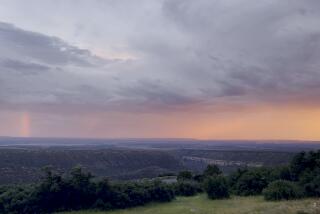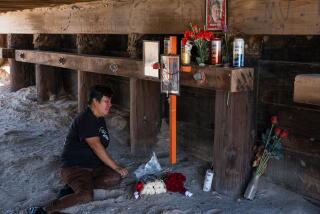Yangshuo, a reverie amid rocks
- Share via
Somewhere between the strange green and gray limestone peaks jutting out of the plains like misplaced teeth, past the village of 200-year-old yellowing huts, along narrow earthen paths raised between sodden rice paddies, I heard music.
Our guide pushed her bicycle a little farther along the trail, and gradually a clear, zigzagging river came into view. Down the sunlit water, a local man poled a flat boat carrying a small group of passengers. They were singing a local folk melody and gazing hungrily at the fantasy-like landscape.
Our guide, a middle-aged woman named Ying from the nearby countryside, grinned when she saw our mouths agape at the scenery.
“All the people say Guilin is the most beautiful place in China, but then they say Yangshuo is more beautiful than Guilin,” she said, chuckling.
Yangshuo, a town of 300,000 residents about an hour south of the southeast tourist mecca of Guilin, has a singular reputation among foreigners who have spent time in China. It has all the special elements that make a place irresistible to backpackers: spectacular, largely undeveloped scenery ripe for exploring by bike or boat or with a rack of climbing gear; cheap accommodations; interesting trinkets; tasty food; and locals who manage to maintain their cultural roots while reaching out to those from other countries.
My husband, Michael, and I arrived in Yangshuo at the end of a monthlong, travel-heavy winter holiday. After spending six months in China, I felt strangely at home on the pedestrians-only Xi Jie, or West Street, at the town’s center.
Why I felt that way wasn’t apparent at first. Then I began to notice small, comforting things. The tall, narrow wooden buildings graciously leaning over the stone street. Cafe walls lined with books in Chinese, English and a multitude of other languages, an invitation to loiter. And, as evening set in, laughing people spilled onto the sidewalk, around tables set with candles, as though it were Paris.
But this clearly wasn’t Paris. The price of our hotel room alone (less than $10 a night) could testify to that. And so could the wild, mystical landscape outside.
Much of Guangxi province, where Yangshuo is, is made up of limestone, likely formed of shells and sediment from a prehistoric sea. Fissures in the limestone helped rainwater and rivers erode weaker bits of earth over the centuries, leaving a forest of hauntingly lovely vertical crags protruding from a flat stretch of farmland and rivers.
Hotels and paved roads
Backpackers discovered Yangshuo about 20 years ago, said our guide, Ying, but the surrounding area remained largely undeveloped until the last two or three years. Now Chinese tour groups are beginning to visit Yangshuo, and local entrepreneurs have answered demand with a building frenzy, raising big hotels on the outskirts of town, paving roads and building docks for tour boats along the picturesque Yulong and Li rivers. Many lament the impending development and fear rising prices on accommodations and activities.In town, visitors can spend their time shopping, watching Hollywood movies at cafes, feasting on Chinese, Western or fusion cuisine, or studying Chinese medicine, language or martial arts. The more adventurous can head to the surrounding countryside to climb karst peaks, take a mud bath in a local cave, watch villagers fishing at night with cormorants and little lights, or float along the rivers in bamboo rafts.
Michael and I christened the first night of our five-day stay in Yangshuo with oversized mugs of hot chocolate and brandy at a bar called MC Blues. The small, eclectically decorated room seemed stuffed to its rafters with adventurers, most of them kicking back after a hard day of bicycling, rock climbing or souvenir shopping. As many backpackers know, nearly every other backpacker in the world is automatically a friend, and as we snuggled with a new litter of kittens burrowing in a warm corner of our booth, we traded traveling tales with English, Welsh and German patrons at a neighboring table, shouting to be heard over the music.
The next morning we rented mountain bikes from our hotel for little more than $1 for the day. Ying, who had sold us on her services as soon as we disembarked at the town’s bus stop, would guide us to a nearby peak called Moon Hill so I could scratch the itch I’d been having to climb one of these tantalizing towers.
Leaving West Street, we followed Ying into the more Chinese part of town, crowded with little stalls. We cycled a short distance down a paved road, then cut onto a dirt path.
“I will take you the small way,” she said.
“Small,” we discovered, did not refer to the length of the trip but to the size of the road — in places only a dirt path a few feet wide balanced between rice paddies and gardens or groves of small orange trees.
We crossed the narrow, pristine Yulong River and passed farmers accompanied by their families or by water buffalo. Ying called out greetings to some of them, and chattered half in Chinese and half in English with me about her two children.
Finally, we turned our bikes around a corner, and Moon Hill came into view. Its strange limestone formation left no one guessing how it got its name. The molar-like cone rises nearly 755 feet into the sky and is shot straight through with a gibbous hole. From the bottom, other rocks obscured parts of the “moon,” and it seemed to wax or wane depending on the angle from which we viewed it.
Ying stayed below and watched the bikes while Michael and I tackled the short but steep climb. Though the stone steps were dilapidated, we appreciated their aid in helping us ascend what would have otherwise been a near vertical scramble up the peak, still lush in midwinter with green bushes and moss.
At the top, as we surveyed the scene below, we sucked on mandarin oranges that I had bought from a wizened local squatting on a bridge across the Yulong. The peaks rolled out for miles. I could imagine this strange land as the bottom of the sea, the limestone columns as chunks of coral, the mist swimming like a current between them. On the bare rock of the arch that formed the moon, chalk marks confirmed the area’s popularity among rock climbers.
A nearby plaque explained that American climbing guru Todd Skinner and others from the United States helped develop routes on these rocks in the early 1990s. Wishing I had brought my gear, I scrambled up a couple of lower overhangs to work up an appetite.
For lunch, Ying borrowed the kitchen at a nearby inn and cooked up a satisfying meal of stir-fried vegetables, sausage and rice, finished off with watermelon seeds.
Rainy boat ride
West STREET was brimming with life by the time we returned. But before diving into my first dish of lasagna in six months — oddly noodle-less but delicious nonetheless — at the Drifters restaurant, I headed to the stalls along the street, hunting for blue-and-white batiks made by ethnic minorities in neighboring areas. Yangshuo is known as one of the cheapest places in China to buy them, and by the time we left town I’d collected more than two dozen tablecloths, scarves and wall hangings.The next day was drizzly and gray, and I left Michael to relax at our hotel while I breakfasted at a nearby cafe on flat, crepe-like pancakes lumped with chunks of fresh banana. Then I caught a local bus north to nearby Xingping, because some backpackers had told me I could shave hundreds of yuan off the price of a cruise down the Li River, generally regarded as one of the highlights of a trip to Guangxi province.
Perhaps on days other than a rainy Sunday that’s the case. Xingping seemed almost deserted when I arrived, and I was thankful when a local trinket vendor offered to have her husband take me back to Yangshuo in their family’s somewhat noisy boat (built for perhaps 30 passengers) for less than $10. It was about four times what I’d planned on paying.
For 2 1/2 hours, I shivered while gazing through the rain at yellow-green bamboo, drooping over the water from flat banks, at caves and whorls, delicate stone filigree carved by the river into the cliffs that rose from the water.
A group of women in red sweaters washed laundry in the clear water while their children tossed river stones around their feet. It was beautiful but cold, and I was glad when we pulled into Yangshuo.
The night before, everyone had been outside, dining along the sidewalks of West Street. But that night the cold drew us inside the restaurants, where we crowded in for warmth.
Markets, bars and socializing
Michael and I finished our holiday with a day of rest, ambling along the side of the Li River, through town parks and — I confess — more batik markets. In the afternoon, I wandered back into the MC Blues bar. Two waitresses we met on our first night were there alone, huddled next to the ubiquitous iron pot on the floor that serves as a space heater in many Yangshuo establishments. They were stoking it with charcoal sticks.One waved me over to the spot next to her, and I warmed my toes while Jenny chatted about her town in a sort of pan-European English accent that she probably picked up from the bar’s clientele. The 19-year-old found the bar a good place to practice English, as well as conducive to a healthy social life. “We can talk about food and travels,” she said. “In the summer it’s busy every night. Everyone is happy, and all the restaurants put their tables out on the sidewalks. There’s lots of music and sometimes dancing.”
At dinnertime I met Michael at the Karst Cafe across the street, which, like many restaurants in town, held lacquered, hewn-log tables, with batik tablecloths of various designs tossed casually over them, as though such beauty were an afterthought. It was a refreshing change after so many stark, concrete places that we’d unwillingly frequented on our travels through China.
Because it was our last night in Yangshuo, I wanted to try beer fish, the local specialty. The dish, though heaped with cilantro, tomatoes and other delicious herbs and vegetables, turned out to be mainly made up of soft, bony carp. But I wasn’t about to let that ruin my evening. Michael and I returned to MC Blues to drown our beer fish blues in more giant hot cocoas and brandy, playing cards with Jenny until we could barely keep our eyes open.
The next morning, on my way out the door to catch the bus that would take us to the train bound for home, I passed a blond woman I’d seen in a cafe the previous afternoon. She waved.
“Headed out?” she asked.
“Yeah,” I said, regretfully. “What about you?”
“Well, I was supposed to start a new job in Shenzhen next week,” she said, grinning a little shamefacedly. “But I think I’ve just landed a teaching job here. I’m just not ready to go.”
Neither were we.
*
(BEGIN TEXT OF INFOBOX)
Mystical Yangshuo
GETTING THERE:
From LAX, connecting service (change of planes) to Guilin is available on China Southern, Asiana, Cathay Pacific, Korean, China Eastern and Thai. Restricted round-trip fares begin at $984.
From Guilin, buses leave frequently from the train and bus stations for Yangshuo.
TELEPHONES:
To call the numbers below from the U.S., dial 011 (international dialing code), 86 (country code for China), 773 (the area code) and the local number.
GETTING AROUND:
Foot, bike and boat are the best ways to see Yangshuo. You can rent bicycles at many hotels or shops on West Street. Your hotel should be able to help you hire a boat for a tour. Most leave from the harbor off Binjaing Street. An English-language map is available throughout town for about a dollar.
WHERE TO STAY:
Xi Jie (West Street), where most of the hotels are, is about a two-minute walk from the bus station. Hotel touts may try to woo you, but don’t agree to anything until you’ve seen the room.
Except for high season (April to October), decent double rooms with private bath run less than $13. In low season, ask for discounts, especially if you plan to stay for more than one night.
Bamboo House Inn and Café, 23 Guihua Road; 882-3222. A great little place with wooden floors, soft beds, laundry service and Internet access. Doubles with air conditioning and private baths $9 a night per person. Dorm beds with bath $2 a night.
Morning Sun Hotel, 4 Chen Zhoung Road; 881-3899, https://www.morningsunhotel.com . Just off West Street, this Chinese-style hotel has 23 rooms. Doubles with air conditioning from $18.
WHERE TO EAT:
There are plenty of places to eat on West Street (Xi Jie). Almost all restaurants serve beer fish for around $4. Many also serve delectable banana pancakes, homemade bread and fresh coffee for breakfast. The following are on or just off West Street.
MC Blues, just off West Street. The burritos (about $3) and big mugs of hot cocoa and brandy (just over $1) — not to mention the friendly staff — could keep you there all night.
Drifters, on West Street, makes a mean shepherd’s pie and noodle-less lasagna. Prices run from about $2.50 to $5.
The Reading Room, West Street. Ignore this little West Street establishment’s disappointing chocolate cake. Floor-to-ceiling bookshelves stock a hefty selection of English and Chinese novels, essays and guidebooks.
TO LEARN MORE:
China National Tourist Office, (818) 545-7507, https://www.cnto.org .
— Bethany Beaupain
Bethany Beaupain teaches English in China.
More to Read
Sign up for The Wild
We’ll help you find the best places to hike, bike and run, as well as the perfect silent spots for meditation and yoga.
You may occasionally receive promotional content from the Los Angeles Times.






